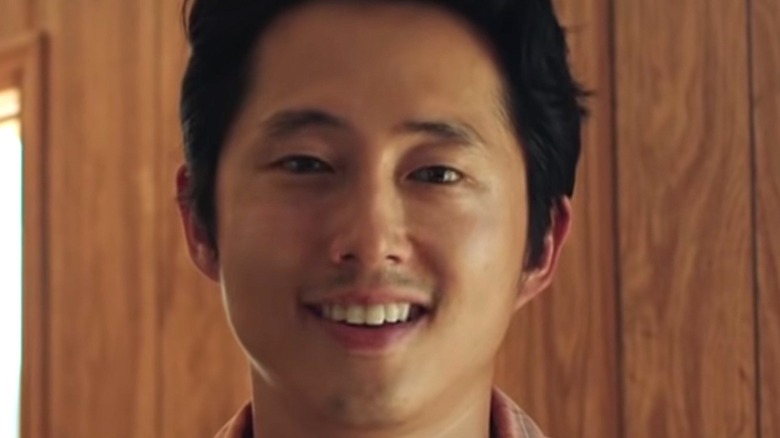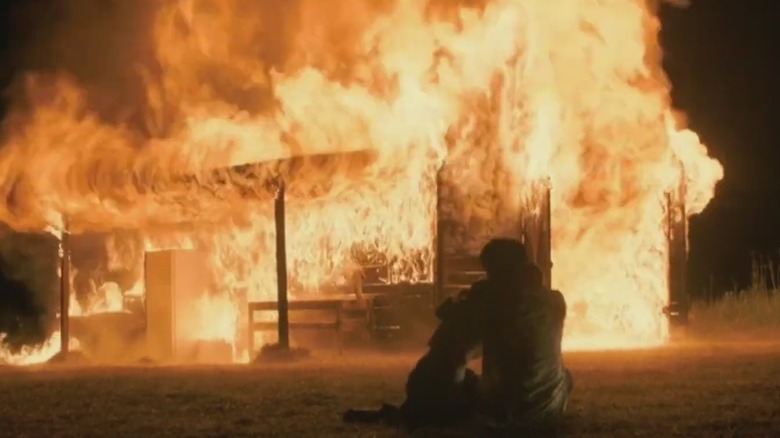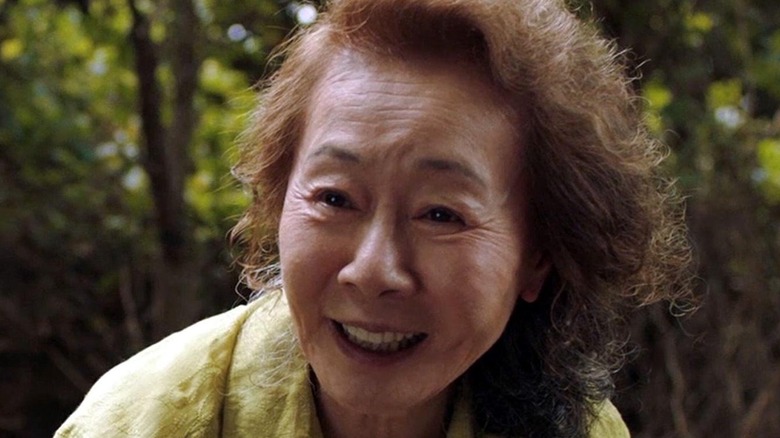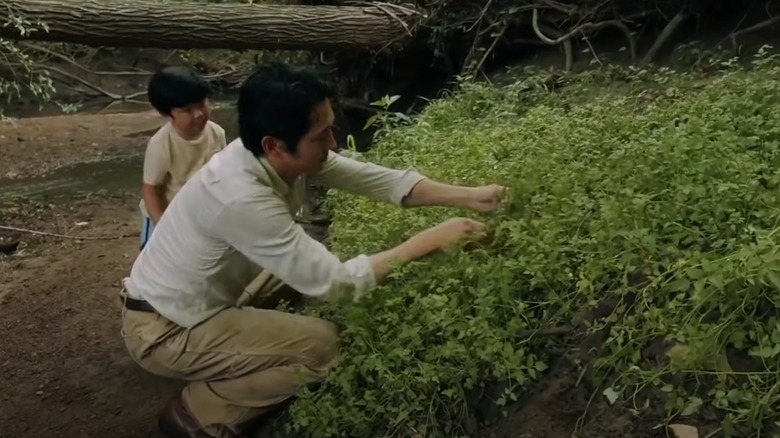The Ending Of Minari Explained
In 2020, audiences were graced by the heart-wrenching drama, "Minari." The film, drawing from the real-life experiences of director Lee Isaac Chung, takes place in 1980s America and tells the story of a Korean-American family relocating to a rural town in Arkansas to start a farm. With its brutally honest, yet tender depiction of clashing cultures and the real struggles of pursuing the American dream, "Minari" was a cinematic gem from 2020 that won over critics and audiences everywhere as one of the best movies from that year. It would go on to be nominated for six Academy Awards, including best picture, best director, best original screenplay, and best actor for Steven Yeun, as well as win one for best supporting actress for Youn Yuh-jung, making her the first Korean to win an Oscar for acting.
With a film containing as much thematic weight to it as "Minari," it's not odd to assume that the film's final act would wrap up many of these ideas in ways that are not so obvious on a first-time watch. But no fear, we have you covered, as we shall now lay out the intricacies of the ending of "Minari." Obviously, spoiler alert for those who have yet to see the film.
The burnt down farm that fixed a marriage
The relationship between Jacob (Yeun) and Monica (Han Ye-ri) is on a downward spiral, to say the least. Jacob's dedication to building his farm often blinds him to the struggle his wife and children face in fitting with this new way of life. Monica must deal with the challenges of raising her children, including David (Alan Kim), who is suffering from heart issues. She also must take care of her mother, Soon-ja (Yuh-jung) who comes from Korea to live with the family and later suffers a stroke. As a result, she has a hard time seeing Jacob's vision for the farm, causing tension between the two. Both Jacob and Monica have the best intentions, but fail to see the struggles both are going through.
The buildup to the finale sees our characters in a dark place, where Jacob and Monica's relationship is in shambles after an argument where Jacob admits to caring more about the farm than the family's well-being. With that, the two agree to separate. But upon returning home, they find that Soon-ja has accidentally set the farm aflame in an attempt to burn their trash.
Jacob and Monica rush in to save the produce as best they can, but eventually, the fire is too much and they save each other from the flames. It's a showing moment that Jacob and Monica are willing to sacrifice themselves for one another in their own ways. Monica helping Jacob save his produce despite the frustration it brought her and Jacob eventually abandoning the produce to save his wife instead speaks volumes to where the hearts of these characters truly lies. There is still hope for them and their dreams, as long as they stick with one another.
David embraces his 'real' grandma
One of the most turbulent aspects to see develop in the film was the relationship between David, Jacob and Monica's son, and Soon-ja. Throughout the film, David largely disregards his loving, yet more traditional Korean grandmother for not conforming to the image of what he believes a grandmother should be. As such, he proceeds to prank her in cruel ways. It taps into one of the hardest conversations the film has regarding immigrant life in the United States, that being the abandonment of one's native culture, with family and native customs considered "foreign" in a negative context. This is a hard topic to discuss, and Chung brings an honest and brutal look at it but develops it in a manner that comes off as genuine and organic. Throughout the course of the film, while the parents are away handling business, David and Soon-ja spend time with one another and grow a near-inseparable bond that's touching to witness. However, following Soon-ja's stroke, the once-lively woman finds herself in a debilitating mental state, often seeing things that aren't there and forgetting names.
But by the end of the film, we get to see just how much the two mean to one another. During the drama with the fire, Soon-ja wanders away from the farm. David and his sister, Anne (Noel Kate Cho), pursue her. David makes an especially valiant effort by blocking her path and eventually, the two guide her home. It's heart-tugging, to say the least, to see David evolve in such a way, offering a promising future where the love for his grandmother will be based on her good heart rather than a superficial, whitewashed definition of American culture, all while connecting to the rich culture she brings with her.
Meaning of the minari
Earlier in the film, David and Soon-ja plant minari seeds by a creek, with Soon-ja telling him that the plants are very durable and are sure to last a long time. This is a key moment in the film for their relationship in particular, as this is the first instance where David starts to warm up to his grandma. Minari is a plant often used in Korean cooking, known for its ability to thrive in harsh conditions, particularly in how it best grows following the death of another plant.
The very end of the film sees Jacob and David venture out to the minari patch, which a buyer has agreed to purchase. As they go about harvesting the plant, Jacob comments on what a good place Soon-ja chose to plant them before the two get to work. It's a perfectly tender ending that practically speaks for itself. Not only has the plant quite literally saved the family after the rest of their produce has been destroyed, but it has also strengthened their bond.
Jacob now has another chance to start the farm, Monica sees how much Jacob means to her, the children have accepted their grandma, and Soon-ja is able to find purpose in supporting the family through her traditions, allowing the family to embrace their heritage rather than run away from it. By the end of the film, the fire brought the cleanse the family needed, and the minari is their gateway to a second chance and a rekindled bond between every member in the process. Through all the hardships, the family has learned from their missteps and risen from the ashes to continue to endure and grow, much like the hearty minari.



